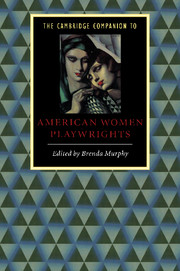13 - Wendy Wasserstein
a feminist voice from the seventies to the present
from Part 3 - New feminists
Published online by Cambridge University Press: 28 May 2006
Summary
As a young girl growing up in Brooklyn, and later in New York, Wendy Wasserstein experienced the conspicuous double standards between boys and girls that ignited her feminist instincts. While her brother received Richard Halliburton’s Complete Book of Marvels - a travel guide to spectacular places around the world - for his Bar Mitzvah, she was reading Eloise and Madeline. And, to instill a sense of feminine etiquette in her daughter, her mother sent her to the Helena Rubinstein Charm School. Moreover, to make her well rounded, she enrolled her in the June Taylor School of Dance. If that were not bad enough, when Wendy showed up everyday in the same work shirt at the Calhoun School on the Upper West Side of Manhattan, the headmistress would call her mother to tell her that she should get dressed up and wear pink (Bennetts, “An Uncommon Dramatist,”). Indeed, she has always felt angry about the importance placed on women’s appearance.
The marginalization of women also became apparent to her in the television shows she was watching as a girl in the fifties. Her favorite television show, Bachelor Father, depicting a debonair, suave small screen “Cary Grant,”convinced her that she would “rather wear a dinner jacket than perform the routine housewife duties of Mrs. Danny Thomas, Mrs. Father Know Best, or especially June Cleaver.”She felt compelled to find a female counterpart for the bachelor father, “a woman who possessed all the vitality of a Broadway musical, whose charms would beguile even Helena Rubinstein, and who never closed herself off from the possibility of adventure”(Wasserstein, Bachelor Girls, 6). Consequently, she became fascinated by Doris Day films, films about bright, self-motivated, charming, willful women, who approached life with guts and gusto.
- Type
- Chapter
- Information
- The Cambridge Companion to American Women Playwrights , pp. 213 - 232Publisher: Cambridge University PressPrint publication year: 1999
- 1
- Cited by



